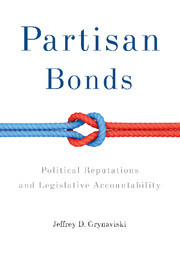Description
Partisan Bonds
Political Reputations and Legislative Accountability
Political Economy of Institutions and Decisions Series
Author: Grynaviski Jeffrey D.
Argues that voters rely on partisan cues because party brand names provide credible information about how politicians are likely to act in office.
Language: English
Subject for Partisan Bonds:
Approximative price 32.87 €
In Print (Delivery period: 14 days).
Add to cart
Partisan Bonds
Publication date: 08-2013
Support: Print on demand
Publication date: 08-2013
Support: Print on demand
Approximative price 67.55 €
In Print (Delivery period: 14 days).
Add to cart
Partisan Bonds
Publication date: 02-2010
260 p. · 16x23.5 cm · Hardback
Publication date: 02-2010
260 p. · 16x23.5 cm · Hardback
Description
/li>Contents
/li>Biography
/li>
Political scientists have long painted American voters' dependence on partisan cues at the ballot box as a discouraging consequence of their overall ignorance about politics. Taking on this conventional wisdom, Jeffrey D. Grynaviski advances the provocative theory that voters instead rely on these cues because party brand names provide credible information about how politicians are likely to act in office, despite the weakness of formal party organization in the United States. Among the important empirical implications of his theory, which he carefully supports with rigorous data analysis, are that voter uncertainty about a party's issue positions varies with the level of party unity it exhibits in government, that party preferences in the electorate are strongest among the most certain voters, and that party brand names have meaningful consequences for the electoral strategies of party leaders and individual candidates for office.
1. Introduction; 2. Theory; 3. Voter learning about parties; 4. Party unity and the strength of party preferences; 5. Reconciling candidate and party brand names; 6. Brand names and party strategy; 7. Conclusion.
Jeffrey D. Grynaviski received his Doctorate in Political Science from Duke University in 2002. Since that time he has been an Assistant Professor in Political Science at the University of Chicago. He was a recipient of the prestigious George A. and Eliza Gardner Howard Foundation Fellowship for the 2006–7 academic year. His previous research has been published in a range of scholarly journals, including the American Political Science Review, the Journal of Politics, Political Analysis, the Journal of Theoretical Politics, Party Politics, and Dubose Review.
© 2024 LAVOISIER S.A.S.




